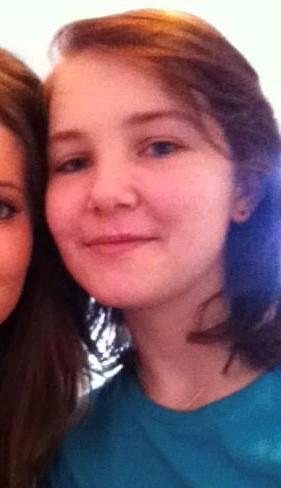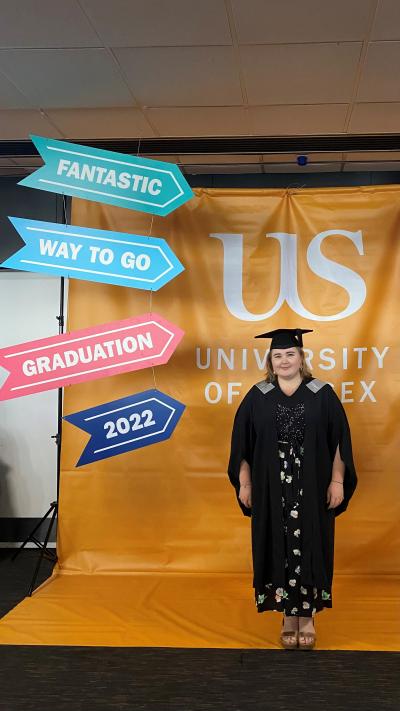Life after a chronic myeloid leukaemia diagnosis
Sophie B
Sophie was 14 when she got a chronic myeloid leukaemia diagnosis. As part of blood cancer awareness month she shared the story of her diagnosis, went into detail about her treatment and talked about the importance of the tailored age-appropriate support offered by Teenage Cancer Trust.
When I was 14, I started to lose a lot of weight and my periods stopped. I also started getting night sweats. I was struggling to eat my meals as I felt full up and I was craving cucumber and ice cubes.
My mum was worried that I had an eating disorder but didn’t want to voice her concerns to me. I hadn’t really noticed my weight loss as I wasn’t looking out for it. My mum suggested we go to the doctors under the guise of getting my hormones, blood sugar and vitamins checked out.
I went to the doctors a couple of times and one doctor thought my symptoms were down to stress because of starting my GCSEs but I wasn’t examined properly until my third appointment a month after the first. I then went out for the day with my mum and my boyfriend at the time. When we got back, we’d had an answerphone message telling us to go straight back to the GP.
He told us that he had really strong suspicions that I had Leukaemia, but he wasn’t sure what type. The stress, anxiety and fear of the unknown took over and mum and I just cried.
The doctor rang ahead to the local hospital and then we went home, packed a bag and mum, dad and I went straight in. My grandparents looked after my little sister. She was only seven and too young to be told what was going on.
Two days later, they confirmed that I had Chronic Myeloid Leukaemia by a bone marrow biopsy at Southampton General Hospital. The doctor had been right and had diagnosed me on the spot. The type of Leukaemia I have is really rare in my age range and more common in people in their 50s and 60s.
It turns out that I had lost weight because my spleen was ten times bigger than it should have been. So, I was too uncomfortable to eat more. I was craving cucumber and ice as the night sweats were leaving me dehydrated.
The importance of age appropriate support
I was blue-lighted to Southampton General Hospital, and I started my treatment there. The Teenage Cancer Trust unit wasn’t in place then, and I was in the in-between stage of not being a child but not being an adult, which meant there was a lack of dedicated rooms and provision for people my age.
It meant I was sharing an area with a much younger child and there were other children around who were obviously very upset with what was happening. It wasn’t easy being around that, but I tried to think about what they were going through.
Treatment
I was started on Tyrosine Kinase Inhibitors. These are pills which you take orally, and they are designed to attack specific types of cancer cells and cause less damage to ordinary cells. I was on Imatinib to start with, but I have a chromosome abnormality, called the Philadelphia chromosome, which means I am more likely to become immune to something if I keep taking it for a long period of time. I was on that for about six months before they changed me to Dasatinib as I developed an immunity to Imatinib, and a bone marrow drive was launched in case I needed it.
The pills can affect people differently, but it gave me severe joint pain, so I chose to move to Nilotinib. This gives fatigue and bouts of joint pain, but that only comes if I am busy or standing around for a long time, so that is more manageable. It does make me retain water and sweat more though, which isn’t ideal.
I also had to have monthly blood tests and bone marrow aspirations every three to six months. Luckily, the Snowdrop Trust nurses were able to come to me at school to do the blood tests, so I didn’t miss too much time.
I’m in remission on a molecular level, so they have reduced my dosage recently to see how I get on and then they may see how I react If I come off it in the future. When I want children, I will need to plan with my consultant to come off it while I am pregnant, and they’d monitor me to see if I need to go back on it.
Teenage Cancer Trust’s unit
The Teenage Cancer Trust unit at Southampton opened a couple of years after I started my treatment, and I was given a tour of the unit so that I was familiar with it. When I was shown around the new ward, I was impressed with the number of gadgets and activities available to inpatients. There was a pool table, jukebox and games consoles in the lounge area where people could socialise or spend time with family. All of the rooms were bright and airy and was a big difference to my experience on the children’s inpatient ward. It felt a lot more grown-up while also being more teenager friendly with things to occupy your mind during a difficult stay.
While having treatment on the Piam Brown ward and then adult oncology outpatients at Southampton, Jo, one of the Teenage Cancer Trust nurses kept in touch with me to be kept up to date with my healthcare as well as offering support and Teenage Cancer Trust opportunities and outings.
Ultimate Backstage Experience at the Royal Albert Hall and other activities
I was introduced to Teenage Cancer Trust’s Youth Support Coordinator at the time who organised different events with patients. We went to Bournemouth beach and went out for various meals.
I was lucky enough to go to the Ultimate Backstage Experience at the Royal Albert Hall with her twice and also the Find Your Sense of Tumour residential weekend. I really enjoyed both experiences and met people who I am still friends with now.
I applied to go to the Ultimate Backstage Experience in 2023 and this time I got to take a friend. I’m a teacher and I took the drama teacher from school as I knew she would enjoy it. She told people I was a music teacher, and it was my dream to be onstage, so I did the speech onstage to the audience. When I’d been to UBE when I was younger, I’d hidden at the back when the group went onstage and so I was really nervous during the soundcheck because I knew I’d be at the front this time and speaking. I was trying to think about what I would say. But when I went onstage to speak, my planned speech went out of the window and I just spoke from the heart, so I didn’t get a chance to get nervous. I could only see the people who were in the first two rows due to all of the lights, but they seemed happy and supportive. I enjoyed the experience and I’m glad that I did it.
More blood cancer stories and information
Read more stories and information on blood cancer







